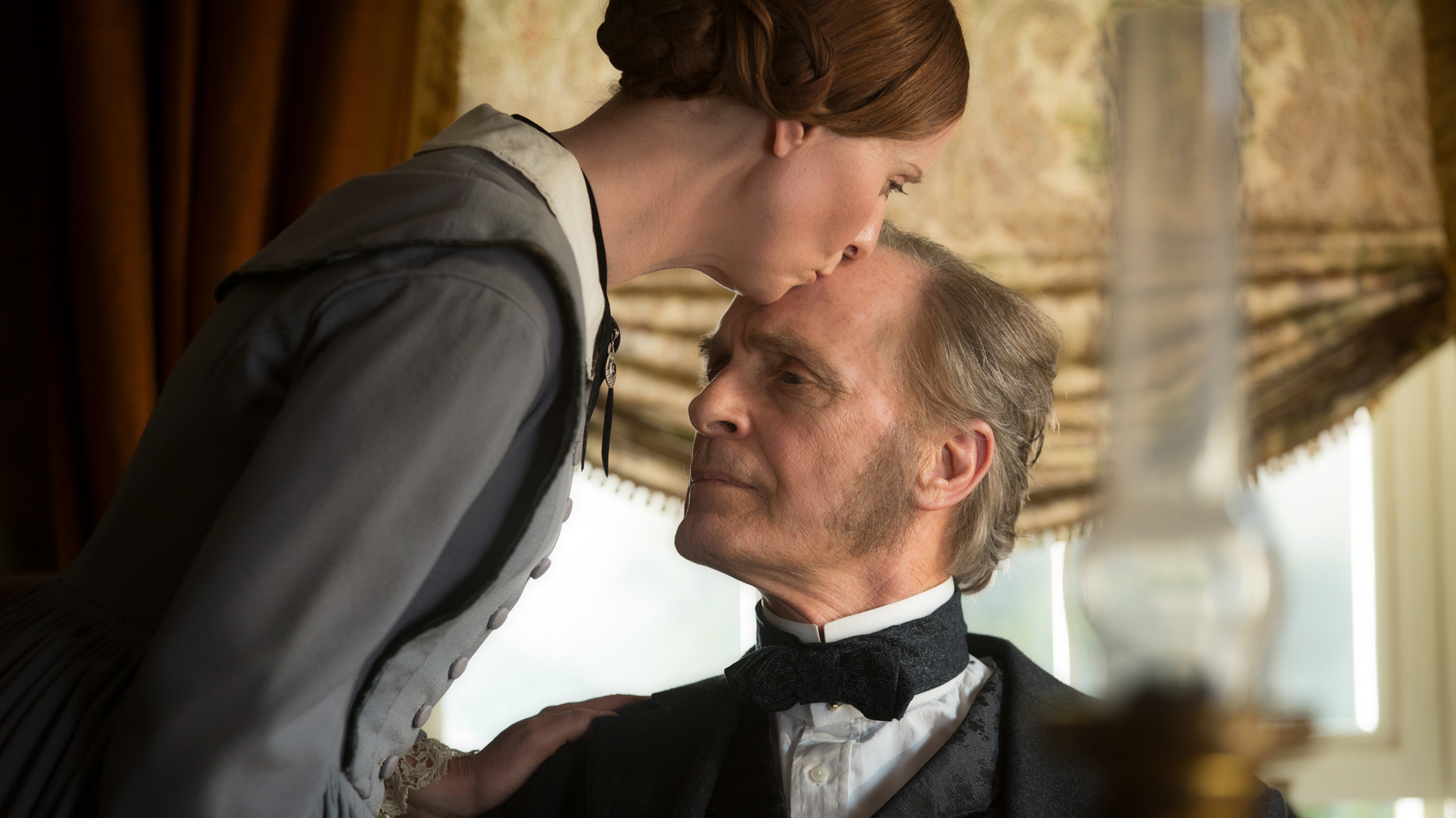“Knowledge sown in Gaia’s bones…/Her uncorrupted soul/Will
not be possessed or owned.” Briskly intoned by Tori Amos and her daughter
Natashya Hawley on the centrepiece song, “Up the Creek,” these lyrics are among
those that cut closest to the heart of the concerns of Amos’s new album, Native Invader, a record which frequently
turns to nature, to the rhythms of (Mother) Earth, as a source of strength and
wisdom against divisive, destructive forces. As the album’s pitch-perfect title
suggests, and its closing (bonus) track “Russia” makes clear, these forces may
be internal as much as external, referring to illnesses and disabling thoughts that
might inhabit/inhibit an individual as well as to the oppressions perpetrated
by leaders against their own people or against the land itself.
Originally inspired by a Smoky Mountains road-trip undertaken
last summer, the album, Amos has said, dramatically shifted its focus due to
two events: the result of the US election in November, and a stroke that left
her mother Mary partially paralysed and unable to speak. In fact, it would be
more accurate to say that Native Invader
combines and fuses all these elements, resulting in a work whose overt combination
of personal and political preoccupations makes it a spiritual sister to two of
Amos’s masterpieces, Scarlet’s Walk (2002)
and American Doll Posse (2007).
Such syntheses have always been central to Amos’s music, of
course. At her best, she’s an artist with an extraordinary gift for taking the
temperature of the present moment, but doing so via unpredictable excursions
into myth and history, and references (variously arcane or direct) to personal
experience that render her work truly unique. The aforementioned “Up the Creek,”
for example, is an urgent, echoy duet that feels both edgily contemporary –
synth stabs, dramatic electronic flourishes, cathartic piano breakdown – and
weirdly old timey in its incorporation of the expression “Good Lord willin’ and
the creek don’t rise” (itself made into a Jerry Reed-penned, Johnny
Cash-popularised song in the 1950s). That expression (apparently a favourite of
Amos’s beloved Cherokee Grandfather) is suitably subverted here, not least through a
title that nicely nods to the notion that the phrase might refer to the Creek
people as much as a body of water.

In its allusiveness, then, Native Invader is an album that makes the listener work: don’t be surprised to find yourself
inspired to brush up on the theories of Carl Sagan, Thomas Nast’s 1830 cartoon
of Andrew Jackson as the “Great White Father,” or the Veil of Veronica at
various points as you listen. Following such trails is not only productive and
exciting, though: it also seems absolutely central to the anti-isolationist ethos
of an album that stresses the value of making connections, of seeing one thing
in terms of another. Of building bridges, not walls.
As an in-house production built around Amos’s collaborations
with her engineer/guitarist husband Mark Hawley (plus John Philip Shenale on
two tracks),
Native Invader shares much
the same base as its predecessor,
Unrepentant Geraldines (2014), which came after two of Amos’s most ambitious collaborative projects:
the epic classical song cycle
Night of Hunters (2011)
and the sublime musical
The Light Princess (2013) at the National Theatre. But the sound here is darker, richer-toned,
and more ambient than the lighter, lower-keyed arrangements on
Geraldines, sometimes gesturing back
to Amos’s more elaborately produced works:
from the choirgirl hotel (1998),
To Venus and Back (1999), and
Abnormally Attracted to Sin (2009).
A case in point is the album’s stunning opener “Reindeer King,”
a majestic seven minute epic on which strings and synths are used
as haunting accents to Amos’s piano-work, which is gorgeously rich and deep
here. In commanding voice, Amos locates the listener (after Eliot) “at the still point of the
turning world,” reporting the title character’s advice to the divided. Entrancing
and cinematic, it’s a spine-tingling song, destined to be canonised as a
classic in her catalogue.
Without ever quite hitting that height again, the rest of
the album offers many pleasures and puzzles for the listener. Those with
kneejerk objections to Hawley’s guitar-playing (which is rather dominant throughout
the first half) may be as resistant to the record as those sad cases who still
keep complaining when each new Amos album
turns out not to be
More Boys For Pele.
But those listening without prejudice will find that Hawley’s
contributions add nuance and atmosphere at their best. Warm washes of guitar reverberate through the
measured, deceptively mellow first single “Cloud Riders,” on which a
shooting star serves as an ambiguous portent of challenges to come, and the sensuous “Wildwood” which finds replenishment in the forest on its way to a poignant reunion. Meanwhile,
there’s wah-wahing urgency to the intricate “Broken Arrow,” another
standout track that advocates the avoidance of snap judgement reactions to
political events at the same time as it urges citizens’ to vigilance of those
in power. Amos drops a heart-stopping piano part behind her tribute to the
resilience of “Lady Liberty” and the nation she represents: “she may seem weak/we may be battleweary/still
those songlines sing.”
The album gets into somewhat stickier territory when it
ventures into what has been one of Amos’s strongest suits: couples’
communication and relationship conflict. The twitchy, skeletal “Chocolate
Song,” a tale of warring opposites spun from a domestic scene, works best as a
rejoinder to Geraldines’s “Wild Way.” But the notion of “vowels and consonants” as “weaponry” was more
dynamically explored on Night of Hunters’s
great “Battle of Trees,” while the cooed opening line to the chorus sadly sounds
destined for a Thorntons’ commercial. The softly pulsing “Wings” fares rather better as a song of relationship
renegotiation, Amos bringing both sadness and sultriness to her delivery. Still
the track doesn’t quite take flight, especially when the lyric “Sometimes big
boys they need to cry” renders the theme too explicit.
More compelling and mysterious by far is the plaintive piano dirge
“Breakaway,” a quiet heartbreaker that laments betrayals, words unsaid and
associations regretted, Amos smuggling in a tribute to a cherished collaborator
and a reference to Miss Saigon, to boot. The beautiful “Climb” movingly
sketches out suggestions of childhood transgression, trauma and shaming (and the
challenges of overcoming that legacy) to brisk acoustic guitar and piano, with
superb lyrics to make Sylvia Plath proud.

The one-word-titled
alliterative songs are among the album’s oddest impulses. “Bang” is driving and
dramatic, boldly subverting anti-immigrant sentiment through astrophysical
references as it defines all humans as refugees from the cosmos,
“molecular machines” composed of star stuff. “One story’s end/seeds another to
begin,” Amos intones, and the song builds to an exhilarating finale. “Bats,” by
contrast, is drifting and ambient, Amos’s narrator anticipating the arrival of
a mythological female force: “dripped in mist sisters rise/quietly from
the fens and marshes/… Keep
breathing, girl.” “Benjamin” celebrates other subversives, approaching the
“Juliana vs. United States” climate change case via the figure of a “science
whiz” investigator. There’s some lyrical awkwardness here, but the track’s proggy,
retro ambience is arresting, with bleeps and buzzes providing their own message
to decode.
The song leads into the album’s closer “Mary’s Eyes,” on
which Amos confronts her mother’s aphasia. In contrast to the more intense and
lugubrious tone of the similarly-themed title track of The Beekeeper (2005), the vigorous piano work and beautiful strings here give
the track an uncanny jubilance, as Amos refers to attempts to communicate through
music. The sentiments expressed in the chorus encapsulate the mood of an
album that's as devout as it is questioning, its merging of
Christian, Pagan and Native American beliefs speaking not only to Amos's personal
history but to the history of America itself. In a culture that presently feels so
divided and fragmented, the record seems dedicated to revealing the importance of connection, the multiple ways in
which, as “Mary’s Eyes” has it, “patterns matter/stringing sequences together matters.”
The titles of the bonus tracks, “Upside Down” and “Russia,” gesture
back to two of Amos’s earliest songs. Intimate piano-only numbers which are equally
delicate yet determined in tone, the former focuses on an outsider’s resolution
to see the happiness of others as inspiration rather than threat. Book-ended by numbers station samples, “Russia” is more pointed, highlighting the divisions stoked by
both Left and Right as it locates State surveillance in the East and West. A Russian leader (though not necessarily the one you might expect) gets name-checked, as Amos at last unfurls the album’s title here.
It's a
stirring, quietly anthemic conclusion to an album which, despite a couple of underachieving
moments, feels vital, its combination of the combative and the conciliatory
speaking directly to our polarised period. Encompassing earth and
sky, spirit and machine, science and soul, Amos has once again produced a
richly absorbing record that bestows balance, bringing us back to ourselves,
giving us the strength and courage to go on.
Native Invader is released on Decca Records on 8th September 2017.
All album images by Paulina Otylie Surys.
My interview with Amos will be published at PopMatters next week.





































